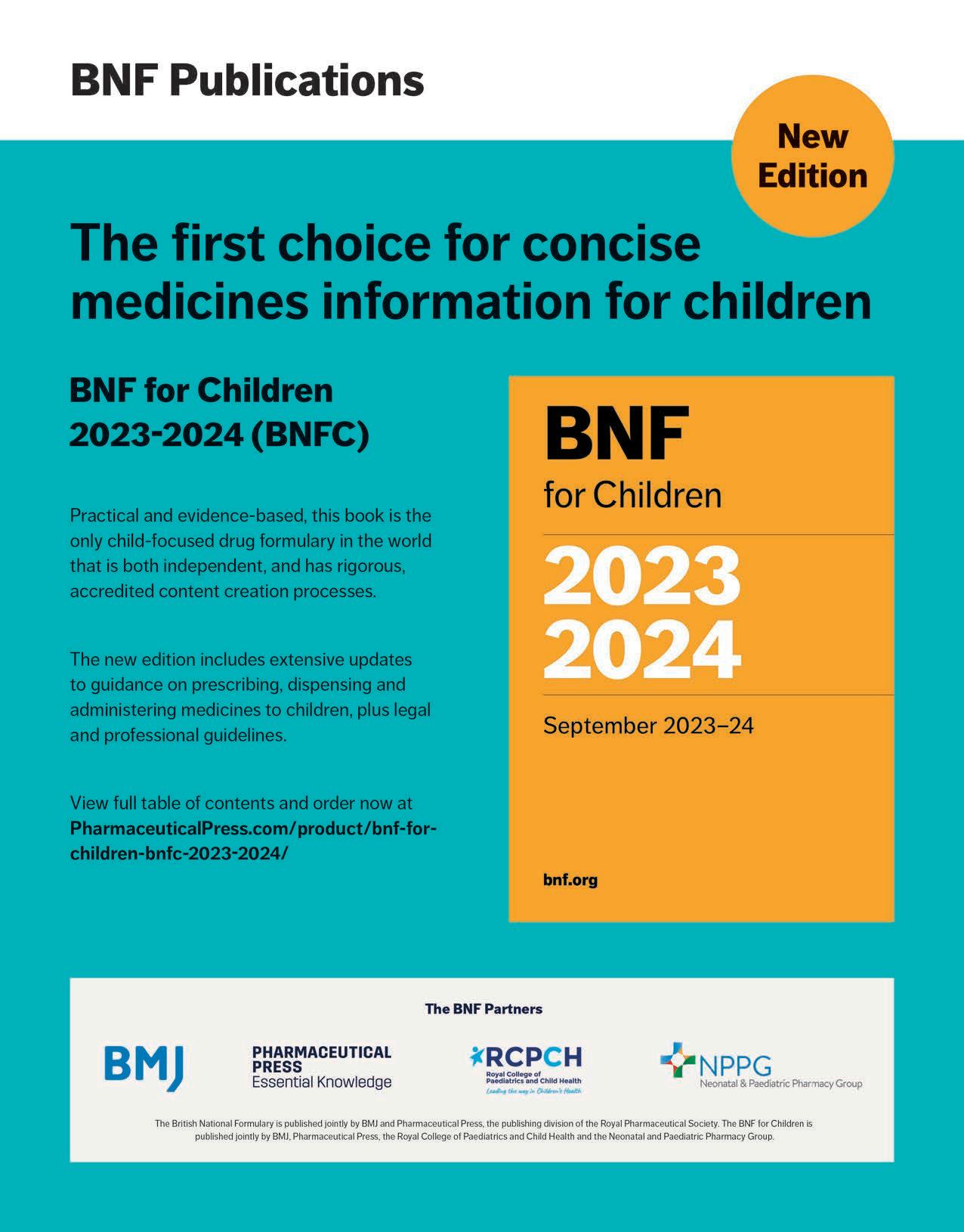






























Welcome to the Spring 2024 edition of Milestones! We hope that this edition has something for all. Thank you to everyone that has contributed to another bumper issue. Speaking of contributions, the editorial team would like to give special thanks to Dee Aswani, Consultant Paediatrician in Sheffield, who has sadly stepped down as part of the team to take on an even bigger challenge. Dee brought warmth, humour and a great deal of sense to the team – hopefully you will also find some of these attributes in this edition! We would also like to thank Camilla Kingdon for all her contributions to Milestones during her spell as President, and welcome Steve Turner, President Elect to this edition with a fantastic book review. I am especially pleased to welcome back our regular “Starter for Ten” and “Day In The Life” features, giving us a chance to learn a bit more about some of our fantastic colleagues. We are always on the lookout for stories, so please do get in touch at milestones@rcpch.ac.uk or say “Hi” to us in Birmingham!
Hannah Baynes General PaediatricianWe’d love to hear from you – get in touch at milestones@ rcpch.ac.uk

10 There's a GeNotes for that Using GeNotes to embed
11 We can talk
Equipping HCPs to tackle mental health crises in CYP
12 Doctors across borders
Three marvellous 'misfits' working with Powering Up
15 Age assessment X-rays Is it time to stop using them?
16 Child protection
The first national audit of Child Protection Medical Assessments
18 Protecting the most vulnerable
Introducing a traumainformed, integrated pathway
20 #ShiftTheDial goes to Parliament
Speaking up for CYP about the effects of climate change

22 NPEWS
The new National Paediatric Early Warning System is here!
24 Learning together
Bridging the gap with Primary Care
4 Update
The latest from the President, news, opportunities and more
9 RCPCH &Us
Climate anxiety explained
25 Wellbeing
Dr Jess Morgan on efficient communication
26 Members
Including reviews and another delicious dish from Dr Ash
30 Day in the life
Paediatric emergency medicine consultant Dr Ian Lewins




 Dr Camilla Kingdon RCPCH President @CamillaKingdon
Dr Camilla Kingdon RCPCH President @CamillaKingdon
As someone who grew up in warmer climes, I am disproportionately excited by spring! So, it gives me the greatest pleasure to welcome you to our Spring 2024 edition of Milestones. This edition coincides with our Annual Conference and so is a great opportunity to celebrate what it means to be a paediatrician and to hear what our children and young people are thinking about and challenging us to do.
This edition marks the end of my three years as College President and I’ll be handing over the pen for this column to my wonderful successor, Steve Turner. I have had an extraordinary time as President and it is going to take many months for me to digest and reflect on everything I have learnt and all the amazing
people I have met during this time. Having recently travelled to India and Nepal on various College duties, I am reminded again how committed and hardworking our membership is and how singular our collective goal is of improving child health – wherever that may be. The contrasts are stark. In Nepal, I celebrated with paediatricians who had finally managed to have a functioning washbasin with soap installed on their neonatal unit. While recently in Leeds we met to learn about the formidable ambitions across West Yorkshire to use data linkage and partnership working to lever real, measurable improvements in health outcomes. What I find so fascinating and humbling is that whatever the ambition, the goal is the same – a deep-seated desire to see children’s health and wellbeing improve. That is the force that binds us and I have seen this in so many settings and places over the last three years. I think Milestones represents this too, and you’ll find this theme throughout this edition’s pages.
Dr Yincent Tse
Consultant
Paediatric Nephrologist
Clinical Director for Patient Safety and Quality
The Newcastle
Upon Tyne Hospitals NHS Foundation Trust RCPCH host examiner
THE MRCPCH clinical exam is a rite of passage. To produce high-quality paediatricians, both for their medical abilities, but also their kindness, team working and communication skills, high standards are set. These exams are practical and rigorous.
After the pandemic hiatus, we restarted hosting the exams in our Children’s Outpatients in October. For the host, logistics started months before in the summer. The backroom staff, administrators and secretaries were the unsung heroes. Lisa, our junior doctor administrator, was the sergeant major, and organised everything from catering and connecting with the exam team at the college, to signage for the day itself.
Examiners from across the UK battled through Storm Babet, with transport delays of over six hours. Everyone had to be fed and watered. We were so fortunate to have a great team of volunteers on the day,
I have also been reminded so many times over the past three years about the size of our workforce problems. The staggering shortfall globally in the healthcare workforce means that wherever one goes, the consistent theme is a shortage of sta . As a College we know this all too well and I am really proud of the work being done to understand the size of the shortfall, model the future requirements and consider what we can do to better support all our Members. Milestones has been an important part of sharing good practice and understanding how paediatricians and our teams are coping and adapting to these challenges. I am certain it will continue to play a key role in tackling this important issue.
I pay tribute to the editorial team who give their time voluntarily to ensure the highest quality articles and subject matter is used. We are indebted to you for another fantastic edition.
With my best wishes and thanks to you all.
Camilla
from nurses, nursery nurses and aspiring and actual medical students, to junior doctors and consultants. Young patients and their families are at the heart of the exams. Candidate after candidate volunteered their battle scars and murmurs. It was a fun day, aided by the boundless energy of our nursery nurse. One young man celebrated his birthday with us in between the sixand nine-minute bells – he said he wouldn’t want to be anywhere else, helping others like himself.
What processes are available for families and patients when a healthcare plan goes awry?
 Dr Tony Hulse Retired Consultant Paediatrician
Dr Tony Hulse Retired Consultant Paediatrician
UNFORTUNATELY, in paediatrics, as in other areas of healthcare, things don’t always go to plan. The reasons for complaints are varied, but include errors, communication problems and, sadly, sometimes tragic outcomes.
If possible, complaints should be resolved locally, but if that is not achievable there is a central agency, independent of the NHS: the Parliamentary and Health Service Ombudsman (PHSO). Families and patients may approach the PHSO directly, but only after attempts at resolving the problem locally have been fully explored. When the PHSO accepts a case, it will appoint an experienced caseworker, who in turn may approach an external clinical advisor whose experience and expertise relate to the case.
In paediatric cases, advisors are usually experienced paediatricians. The caseworker will provide all the required clinical information, usually electronically, a copy of the letter of complaint and the local responses. This may be a lot of information to absorb. The advisor is not asked to undertake any examination or assessments and does not determine the outcome of the case. Usually the caseworker will ask the advisor a very clear list of questions, having prepared the case in detail, and, where possible, the answers need to be evidence-based, using published guidelines and standards that were available at the time of the case. Sometimes these cases go back a number of years, so it is very important to only use information that would have been available at the time, and to avoid “hindsight”.
Using advisors who would have been working clinically at the time of the

complaint can be very helpful. The advice may or may not support the complaint, or may offer alternative reasons for what happened that were not being considered. The advice given needs to be clear, evidencebased, as far as is possible, but above all, unbiased, constructive and helpful.
The work is interesting and can sometimes be quite challenging to one’s own practice. A case I was asked about related to a rare but very serious complication of type 1 diabetes in a child. I found very little had been published, so we went on to conduct our own research into the prevalence of the condition and the accepted clinical practice
at the time. This case stimulated research and challenged our ideas concerning what was then current practice.
PHSO work is remunerated but the main reason for doing this work should relate to what also motivates most parents who complain: a wish to find out the truth, for justice and resolution, and a desire for professionals and institutions to learn from mistakes.
The PHSO needs experienced clinical advisors in all the sub-specialties and anyone who is interested is welcome to contact them at clinicaladvicequeries@ ombudsman.org.uk

AT HEART, Archives is a scientific journal, unique in that it is made up of three quite different editions: ADC, Fetal and Neonatal, and Education and Practice – but you know this already. Philosophically, we only want to publish work that will influence practice, change thinking, and bust – not always benign – myths. But isn’t this essentially what other journals do? To an extent, yes, but this is the reason we have gone further, adding extra seasoning, taste and texture in the form of ethics and law, Dr Claire Lemer’s thought-provoking reviews, editorials, more collaboration with the College, and a platform for advocacy and global health. Many pieces land on the astute radar of our senior editor, Dr Rachel Agbeko, to feature in her brilliant Spotlight
podcasts. If you haven’t already, try these to whet your appetite.
I like to think that the geographical distribution of our wonderful associate editors (every continent bar Antarctica – any offers?) reflects our content and aims. Many RCPCH members live and work in the UK, but we are all global beings, and have a responsibility to advocate for issues relating to children everywhere.
In the spirit of enhancing trainee exposure to assessing scientific writing, we’ve suggested adding those interested from ST4 and upwards onto our potential
reviewer listings. Optional, of course, but there’s no doubt that this has enrichment beyond portfolio-enhancing potential. Some of you will already have experience from thesis or other work, but to facilitate those unused to the process, we intend to provide a tutorial series on the site to help deconstruct what is a daunting but, when broken down, fairly intuitive approach.
Thanks for reading, contributing, challenging and interacting – a journal should be an evolving, living organism. My biggest responsibility is making sure it stays that way.
Listen to these podcasts and more on Apple podcasts: https://podcasts.apple.com/my/podcast/adc-podcast/id333278832
Illegal Migration bill
Inequalities
Toxic effects of nicotine
ADC Atoms
Fetal and Neonatal Evidence-based medicine – Archimedes

I AM DELIGHTED and a bit daunted to take up the challenge of leading the editorial team on BMJ Paediatrics Open, the companion journal to Archives of Disease in Childhood, and an official publication of RCPCH.
BMJ Paediatrics Open is an open-access journal based on the highly successful BMJ Open model, in which papers are judged on their scientific quality and not on their perceived importance. This means that papers that are scientifically and
ethically sound will not be rejected on grounds of priority.
As Editor-in-Chief, I am passionate about and committed to promoting publications that cover the gamut of child health. We are decidedly multidisciplinary and international, and welcome papers from all healthcare and related professionals from anywhere in the world. We will publish qualitative, mixed methods, quantitative research and protocol papers, ensuring that the presentation and interpretation of data is objective and appropriate.
The journal has tremendous potential to bring out the voices and lived experiences of children and young people (CYP). I am particularly proud of our Young Voices section. Last year we led with
a Special Collection on Young Voices in the time of COVID-19. I have a commitment to nurturing young clinicians and researchers who are engaged in cutting-edge research, or policy and advocacy.
We have an exciting line-up of topic collections this year, one on the Health and Wellbeing of Street and Working Children, and another on Preventing and Mitigating the Impact of the Climate Crisis on Child Health. Our intention is to stimulate research on important issues, while raising global awareness and advancing advocacy. We offer waivers for the full Article Processing Charge (APC) for authors based in low-income countries and a 25% discount for RCPCH members. We want to hear from you!
I STARTED MY CAREER working for the NHS and then the London Ambulance Service before delving into the STEM publishing world as an editor of medical journals, focusing on paediatrics, women’s health, obstetrics and gynaecology. I joined RCPCH at the beginning of 2020.
My role is fast-moving and beautifully brings together my fundamental interests and experiences: workforce, advocacy, dissemination and engagement. I lead the department in evidence gathering and reporting, including the UK Workforce Census.
In response to the pandemic, priority quickly shifted to launching the Impact of COVID-19 on child health services tool to monitor the situation across the country, and producing guidance to aid the workforce. I developed the Serious Concerns support channel, and
established an expert panel of clinicians to advise members during unprecedented times. Pivotal to achieving improved child health services is a united, multi-professional workforce. It was a wonderful experience hosting events to support effective integration.
It has been a privilege working with inspiring individuals to advocate for the prioritisation of children and young people, with the ultimate aim of improving child health outcomes. I work extensively with stakeholders to ensure that children’s health is accounted for on the political agenda, and that there is recognition of the pressures faced by child health professionals.
I also volunteer as Committee Officer on the Racial Equity and Cultural Harmony (REACH) Network, to raise awareness about race, ethnicity, diversity, and the benefits of

engaging ethnic minority staff. Spending time with my closest and dearest is a valuable part of my life. I enjoy the theatre, live entertainment and sports, with Kyokoshin karate and yoga being my favourites. Blogging about makeup, fashion and DIY is my passion – I recently installed my first kitchen door and cabinet.



AWARDS 2025



Submit






Speaking truth to power
Find out what happened when team #ShiftTheDial went to Parliament
Listed below are some of the up and coming courses and events, which are online unless otherwise stated. We will add to this list over the coming months, so keep an eye on our website
MRCPCH Applied Knowledge in Practice exam preparation – online workshop
16 April
DCH Clinical exam preparation – online
17 April
Child Protection in Scotland: from Examination to Court Level 3 – two days online
19 & 24 April
Effective Educational Supervision
22 April
How to Manage: Child Mental Health
24 April
Statement and report writing –England/Wales (Level 3) – online 15 May
Expert witness in child protection (Level 3+, 4, 5) –online
04 June
How to Manage: Refugee and asylum-seeking CYP
05 June
How to Manage: Non-malignant haematology
19 June

p20
Read more
How to Manage: Paediatric Allergy Training PAT 3 LONDON
19 June
Effective Educational Supervision
25 June
Statement and report writing –England/Wales (Level 3) – online 15 May
How to Manage: Paediatric Allergy Training (PAT 3)
London
08 July
The Paeds Round, episode 3: Neonatal herpes simplex virus disease – Management
The Paeds Round, episode 4: What’s hot on fever?
The Paeds Round, episode 5: Having a GAS – Group A Strep
Patient safety podcast, episode 3: How do we improve how we learn from harm?
Patient safety podcast, episode 4: Involving children, young people and their families in making healthcare safer
Patient safety podcast, episode 5: The impact of healthcare inequality on patient safety
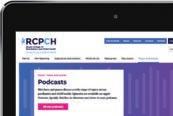



Toby age 18
Shreya age 14
Xai age 13

UNDERSTANDING the limitations and repercussions of dealing with longterm health conditions in schools is important to us and we feel strongly we know our bodies best! Unnecessary punishments can affect our mental health and schoolwork, so we need school rules and processes adapted to help us with specific conditions. Here are three key concerns and how paediatricians can help – talk to us about:
1 Appointments: Scheduling appointments during the school day can have a negative impact on our mental wellbeing and schoolwork. Many lessons are missed due to appointments. We cannot always catch up immediately when juggling other commitments, causing great stress.
2 Who knows what: In school we need to feel trusted when we need a break or when we say we cannot do something. For example, we might not have a parental note to give to the teacher in time, such

as in a sports lesson and this needs to be accepted. We need discreet understanding amongst those who need to know exemption reasons, and not all of us are comfortable with classmates knowing.
3 In-class help: Sometimes we may need something extra to support class engagement. If someone needs larger text, for example, a suitable handout needs preparing, or perhaps a student can view the work on a phone or similar device.
RCPCH &Us: The Children and Young People’s Engagement Team delivers projects and programmes across the UK to support patients, siblings, families and under 25s, and gives them a voice in shaping services, health policy and practice. RCPCH &Us is a network of young voices who work with the College, providing information and advice on children’s rights and engagement.
@RCPCH_and_Us
Talking to us about these concerns in appointments and using a Care Plan as a key means of communication with schools to highlight and address these concerns would be really constructive in reducing stress and making a di erence to us.
The epilepsy 12 youth advocates have created an example care plan you can adapt and use to support us. Please follow this link to find out more: www.rcpch.ac.uk/resources/ epilepsy12-youth-advocates#theimportance-of-school-care-plans
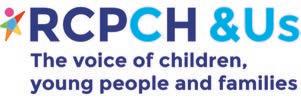
@rcpch_and_us @RCPCHandUs
Chairs of the Genomics Education Programme talk about its flagship resource, GeNotes, and how it could be useful for paediatricians wanting to understand more about embedding genomics into paediatric clinical practice


Dr Emile Hendriks Consultant in Paediatric Endocrinology/ Assistant Professor, Cambridge Chair of Paediatric GeNotes

Dr Ellie Hay Consultant Clinical Geneticist, Great Ormond Street
Chair of Paediatric GeNotes
I want to learn about genomics but don’t know where to start
That’s where GeNotes comes in. It’s a free NHS England online ‘just in time’ resource, designed to help clinicians gain a better understanding of genomics and how it fits into your practice. There are GeNotes specialities covering other areas of medicine, but we coordinate the paediatric collection.
Sounds interesting, tell me more…
GeNotes has two access points. If you’d like to know when and how to request genomic tests, then our ‘In the Clinic’ guides can help you. The ‘Knowledge Hub’ contains an ever-expanding encyclopaedia of resources to help you interpret those test results. We have really worked on making it a user-friendly platform and in feedback, clinicians found it to be very intuitive and that it gave just the right amount of information.
Is it relevant for my work as a paediatrician?
Absolutely. Genomics is a rapidly expanding field and genomic investigations are already a first-line investigation for many presentations across all paediatric subspecialities – not to mention Genomics England’s Generation study (newborn genome sequencing), due to launch in early 2024. This will look at the feasibility and benefits of screening newborns for >200 childhood onset rare genetic conditions in which early diagnosis improves outcomes. We

aim to provide knowledge resources for each of these conditions – useful if you receive a result on your desk.
Let’s work through an example. I want to know what to request for a floppy baby on NICU
There’s a GeNotes for that! An ‘In the Clinic’ guide will explain how to request the various tests that would be appropriate for a hypotonic infant.
What if it suggests that I order whole genome sequencing (WGS). That feels like a lot of paperwork!
There’s a GeNotes for that too. We have a step-by-step guide to get you started with consenting and ordering, making the whole process far less daunting.
And when the results come back confirming a diagnosis of, say, Snijders Blok-Campeau syndrome?
You guessed it – there’s a GeNotes for that! The ‘Knowledge Hub’ has resources on multiple rare diseases with information on associated features, inheritance, and genetic counselling. It contains useful links for clinicians as well as information that you can share with families.
OK, you have convinced me to give GeNotes a try. How do I start?
Just have a go. The ‘In the Clinic’ section of Paediatric GeNotes can be accessed here: www.genomicseducation.hee.nhs.uk/ genotes and the ‘Knowledge Hub’ is here: www.genomicseducation.hee.nhs.uk/ genotes/knowledge-hub or just enter GeNotes in your search engine. Try it with your next patient and don’t forget to share your feedback (send an email to england.genomicseducation@nhs.net with the subject ‘GeNotes Paediatrics’) so we can keep on improving.
There are lots of other short courses, resources and tools available on the NHS England Genomics Education programme website (www.genomicseducation.hee.nhs. uk/genomics-in-healthcare/genomics-inpaediatrics) for those who want to learn more about genomics. The RCPCH also has a profession-specific genomics webpage (www.rcpch.ac.uk/key-topics/genomics), and a downloadable resource on selecting the right genomic test (www.rcpch.ac.uk/resources/ genetic-testing-resources), developed with the RCPCH Genomics Working Group and GEP. Check them both out today.

come to hospital in a mental health crisis, it’s almost always a last resort. Accessing hospitals in these situations comes with so many individual and complex challenges that young people have to navigate. That’s why We Can Talk exists.
We Can Talk is a coproduced culture change programme, delivered by People Unlimited, which aims to improve the experience of young people (aged 1625) who attend hospital in mental health crisis. The initiative is designed to engage all members of sta in acute hospital settings, from porters to paediatricians. We empower hospital sta to feel comfortable supporting young people in a mental health crisis, and letting them know they are in the right place to seek help.
Our journey started in 2017 with one goal: improving mental health crisis care in hospitals. Since then, we have engaged with over 30,000 sta in more than 100 hospitals, with 98% of sta reporting our programme had a positive impact on their job. We are currently in two-thirds of hospitals in England with a Type 1 A&E department. By 2027, we hope to have full coverage.
The need for change in mental health care is evident, with many young people still not receiving the support they need. We Can Talk aims to positively transform the experience for young individuals navigating mental health crises by equipping hospital sta with essential knowledge to treat young patients with the utmost respect, dignity and autonomy.

For those in crisis, We Can Talk helps create an environment that fosters genuine understanding. The emphasis on empathy from trained sta is crucial as it helps to build trust-based relationships between patients and sta . During a mental health crisis, the assurance that hospital sta acknowledge the intricacies of their journey provides comfort and security for the young person. For this reason, we introduced We Can Talk pin badges for hospital sta who have completed our training, conveying a message of safety and showing young people that they are in the care of individuals who are specifically trained to provide support during a crisis.
We Can Talk also focuses on implementing tangible initiatives with our Quality Improvement projects. Developed collaboratively with young people who have lived experience of mental illness and hospital sta , these projects include tools such as wellbeing passports, distraction boxes and mood thermometers. We work hard to create projects that will encourage
young people to feel more comfortable when coming into hospital care.
Wellbeing passports, for example, ensure personalised care and consider the unique needs of each patient, while distraction boxes o er practical resources to alleviate anxiety and stress. The authentic and co-produced nature of these projects ensures that resources are created in a way that will resonate with the individuals they are intended to help.
Through co-production, We Can Talk also gives young people the opportunity to share their lived experience and play a crucial role in developing training and educational content for healthcare professionals. Young Advisors, like us, are involved in delivering national webinars, creating newsletters, managing consultations, and so much more.
At We Can Talk, young people are listened to, valued and respected. Co-production is important because it gives us the platform to help make a di erence for other young people seeking the same support we once did, using our experiences for positive improvement. It puts the young people at the forefront of designing resources that meet the needs of the people they are designed to help. Co-production is an empowering and healing process for many young people, who derive a real sense of purpose and belonging from sharing their mental health journey to help make genuine, lasting change.
Written by Laura Collins, Chris Lam, Mali Twiddy, Jenny Harbottle and Becca Barnett (Young Advisors at We Can Talk)

Dare to be different – healthcare can be reimagined. Meet the clinicians who want to change things up

 Dr Guddi Singh Consultant Paediatrician Director of WHAM
Dr Guddi Singh Consultant Paediatrician Director of WHAM
Despite Médecins Sans Frontières, medicine is a discipline that tends to think within borders.
Siloed, reductionist and quantitative, biomedical science has made groundbreaking advances – as well as a multi-billiondollar industry – on its ability to slice and dice human beings on the basis of demographics and disease.
But what if you don’t fit?
As someone who has never felt at home professionally, I can tell you the cost is high. Loneliness, isolation – is there a more basic human need than the social desire to belong? And yet so many of us feel we don’t. Trans, gender-fluid, queer, disabled, neurodiverse: when we don’t fit into the
boxes carved out for us, we’re made to feel transgressive. We’re made to feel weird.
Judging from our last entry in Milestones, you might well think Powering Up is weird. Our project, which puts young people (YP) front and centre of reimagining healthcare to address health inequalities, is transgressive – but in a good way. As my friends will shortly tell you, for Powering Up, borders are there to be challenged.
First, Mary Salama, Consultant Paediatrician in Birmingham, tells us about how she transcends geographical and sectoral borders in the path-breaking work she leads as a clinician in schools across England’s biggest cities.
Then, there’s the transformation that each YP or clinician experiences in trying to co-produce authentically, changing us from the inside out. Medical student Hannah Ha brings humour to her own horror with
her transition from lived experience into learning, before paediatric trainee Alisha Burman shows how the prosaic can turn poetic. These talented young women remind us that YP occupy a liminal space between youth and adulthood, and that they don’t belong in either.
Which all begs a fundamental question: What is a child? What is a young person, for that matter? And what is health? We don’t pretend to have all the answers, but Powering Up’s team of misfits does promise to cross the borders of the possible on the quest to fi nd them.
“We are defined not by our borders, but by our bonds”
Barack Obama, 44th US President



Mary Salama Consultant Paediatrician & Medical lead for Children with Medical Complexities (CMiC) team Birmingham Women’s and Children’s NHS Foundation Trust
“MISS, MISS!” THE ENTHUSIASTIC teenager called out, “What about a GP chatbot?”
We are in an innercity school in central Birmingham talking healthcare access. It’s a rare moment of blue-sky conversation: a pause in the fast-paced paediatric world of emails, overfull clinics and waiting lists. A connection.
How were we here? Irritation, enthusiasm and to quote My Fair Lady, “With a Little Bit of Luck”.
For 18 months, Lisa and I have been leading the Canal Project, driven by a desire to change the health landscape for children in Europe’s youngest city. Like the waterways that have brought commerce and growth, we hope that by strengthening connections we can travel further together. We recognise the irritation in others of the challenges faced by the youngest and most vulnerable. Together this has fuelled rising enthusiasm in the workstreams of our waterway project. After all, Birmingham has more canals than Venice.
Wary of change fatigue and working hard to simplify processes, we have moved
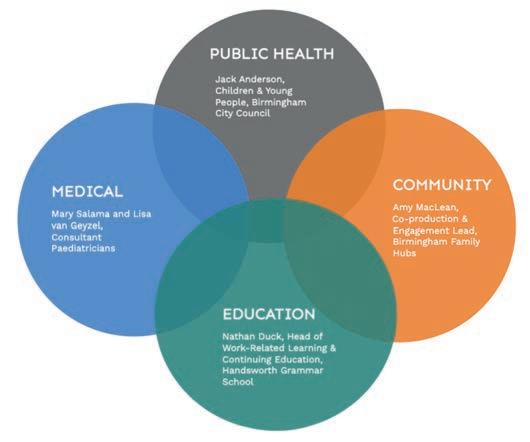
from our Canal Review and Canal Consult to building on shared knowledge in Canal Learn. Next comes Canal Schools (Fig 1).
For this came the lucky connections. First, the unstoppable whirlwind of American-lilted Amy – a super-connector with many roles and an enviable black book. With her is Jack, with his organisation and knowledge of local authority workings. She brought us to Nathan Duck, the inspirational teacher. Finally, some bold emails, and with the Q Exchange as matchmaker, and WHAM and the Powering Up collaborative, our coproduction boy band is complete.
Amy’s HSJ-winning touchpoint plans are tried and tested (Fig 2). This
“We hope that by strengthening connections we can travel further together”
time in touchpoint 3 we really see the magic. The young people, confident in our connection, share stories, their challenges, the logistics, how they translate for family members and look for the medically verified ticks on TikTok. Thoughtful and honest.
We leave with awe and hope. Not bad for a few hours of stakeholder engagement.

 Hannah Ha
Hannah Ha
Final year medical student
University of Leicester
IT ALL STARTED WITH A HORRIBLE headache the night before. My heartbeat drummed out of my chest and into my head in agony. I felt awful. But I couldn’t describe it as more than ‘headache, palpitations, chest pain’. With the medical knowledge of the average 17-year-old, I brushed it o as a migraine, and thought I’d sleep it o .
Twelve hours later, my mum was dragging me to the emergency department. After an ECG and a brief examination, the consultant concluded I was well. My mum insisted I wasn’t and that I looked “far too pale”.
Fast forward and it turned out I had severe anaemia. Suddenly I was down for a spontaneous hospital sleepover, cosied up to four packs of someone else’s blood.
They tossed me onto the Acute Medical Unit (AMU). Imagine being a 17-year-old and the only non-geriatric, non-delirious person in the room. Could I be any further from people like me? I spent the night under the sheets, trying not to tear up.
I had begged to be sent to a children’s ward. Because, despite being a ‘big girl’, I wanted to be treated like the kid I still felt inside. But nope, they stuck me with people who could’ve been my grandparents.
Then, in my third year of med school, the universe handed me a chance to change things. ‘Where do 16-17-year-olds want to be seen in the emergency setting and admitted?’ Great! A project about people navigating this weird limbo between childhood and adulthood in healthcare –people just like me.
I found that only 54.7% preferred paediatric ED, which raised more questions than answers. What’s clear is we – young people – are a mixed bag! There’s so much more to know.
Growing up is tough, and not enough is being done to make it easier for us young peeps to transition into adult healthcare. I’m tired of assumptions and not being heard. Thankfully, there are docs out there who get it. I’m doing my best to become one of them.


ST3 Paediatrics trainee London
WE’VE ALL HAD WORKDAYS that leave us frustrated with the healthcare system. One such day, I felt so disheartened that I found myself writing this on the way home…
AGE CUT-OFFS
It’s nonsense. Who decided them?
It’s a mess.
It’s di erent for each hospital. It’s di erent between services within a hospital.
It’s the unspoken postcode lottery that determines the care a teenager or young person receives.
Whether they are ‘Seen by Paeds’ or reviewed in adult ED.
Whether they are admitted to a paediatric ward, or in an adult bay next to an 80-year-old.
Or whether they are seen by a particular team, as they may not even ‘do’ their age group.
In this case, it was whether they could die at home as they wished or not.
We’re forgetting the patient. We’re worried about service commissioning, capacity, and beds.
How have we got this so wrong? This arbitrary line that decides who is a child needs to be rethought. We’re forgetting the patient.
Powering Up is a collaboration between WHAM (Wellbeing & Health Action Movement), the Canal Project in Birmingham and London hospitals.
Are you a misfit? Join WHAM and share your experience on our blog: www.whamproject.co.uk
Providing good patient care is fundamental. Surely, this is what we all want?
Powering Up has shown me I’m not alone in feeling this.
There are others that want change too. We cannot be forgetting these patients anymore.
We won’t allow it.
As a paediatric trainee, I encounter age cut-o s daily. I navigate these rules only to ‘re-learn’ them on changing hospitals. Mostly it seems like something that I need to accept, but there are instances where it feels that we are worsening health inequality. As a doctor, I have a duty to highlight where systems are failing our young people, but as a junior I feel powerless, as I’m not embedded in a place long enough to help make meaningful improvements.
So, what can junior doctors do?
1. Look after our wellbeing.
Find an outlet that helps us process our experiences.
2. Find your people – those who share our views, create change, and can mentor us.
3. Undertake meaningful projects to shift the system a step closer to the one your patients deserve.
“As a doctor, I have a duty to highlight where systems are failing our young people, but as a junior I feel powerless”
Feeling transgressive?
Contribute to Powering Up’s work, we want to hear from you! Email poweringupproject@gmail.com Wanna grab a coffee?
You can meet us all at RCPCH conference in March. Hope to see as many of you as possible!
How can we make sure the child’s wellbeing comes first when age assessments of new refugees take place?

 Prof Andrew Rowland Officer for Child Protection, RCPCH
Prof Andrew Rowland Officer for Child Protection, RCPCH
A COURT CASE concerning a dubious assessment of a child refugee’s age made waves earlier this year, when media reports revealed that an article on shaving from Gillette had been used as supporting evidence to prove that the child, who had fled from Afghanistan, was actually an adult. The child was the victim of serious safeguarding failures because of this poor age assessment – highlighting just how important it is for these assessments to be conducted properly. Thankfully, the court overturned the decision, and the child is now being cared for.
Determining someone’s age is not an easy task. But when done right, it serves as an essential safeguard to ensure that children are placed in suitable settings. Frontline sta working with unaccompanied children in the asylum system know all too well the consequences of placing them in adult asylum hotels1, and the grave risks they face.
Trained social workers are much better equipped to make age assessments than Border Force o cials, who often only have very brief encounters with young people, shortly after they disembark on to the shore, or exit from lorries or other vehicles at the end of long, dangerous and traumatising journeys. On such journeys, children may have been tra cked in an enclosed, sensory-depriving space sometimes no bigger than a domestic fridge. The current system allows o cials to estimate people’s age based on quick visual assessments and to then send them onto either child or adult settings. Far too often, this results in children being made to go through an adult asylum system. Sadly, things are about to get even worse.
The Home O ce’s latest measures, announced in September 2023, will allow the use of scientific age assessment methods to estimate the age of children arriving in the UK. This would subject them to medical procedures that leading paediatricians consider to be unnecessary, harmful and potentially traumatic – not to mention that they often produce inaccurate results. The measures were debated in the Lords in November, with Peers formally expressing their concerns through a regret motion.
These new scientific methods focus on assessments of children’s dental and skeletal development to determine their possible age. The RCPCH and other leading medical and professional bodies have raised ethical concerns about using scientific methods for examinations that are not medically necessary and only serve immigration control and enforcement purposes. They would expose children to unnecessary stress, harmful medical examinations, and the risks associated with radiation exposure.
Worryingly, the new legal provisions would also automatically consider a person to be over 18 years old if they don’t consent to the use of scientific methods. Of course, the potential consequences of refusal, such as deportation, may make a child more likely to agree to a medical procedure unwillingly. Such consent, given under duress, is widely considered to be unethical and invalid. Unsurprisingly, the Children’s Commissioner has repeatedly questioned these harmful and unnecessary age assessment measures from a children’s rights perspective.
The Government’s own advisory committee2 concluded early last year that there is no method, scientific or social worker-led, that can predict age with precision. It recommended that scientific assessments should only consider whether a claimed age is possible – rather than trying to specify how old someone is.
Despite repeated calls, the Government is refusing to publish data3 on the number of children they incorrectly assessed as adults and placed in adult accommodation, with no safeguards in place, before they were taken into care by local authorities. Estimates from the Refugee Council show that the number of children who are facing serious safeguarding consequences because of such mistakes is well into the hundreds each year. Children who are incorrectly age assessed are badly scarred by the experience. Jamal, a 16-year-old from Afghanistan placed in an adult hotel, told the Refugee Council: “I live alone here, with adults. I don’t have money, I’m worried about the future, I don’t feel good at all.”
This latest development in the Government’s hostile and misguided immigration policy will see vulnerable children continue to su er serious consequences. Legislators have a duty to uphold the highest child protection standards, regardless of how a child came to our shores. An integral part of protecting children seeking refuge and asylum must be to acknowledge that the scientific methods proposed by the Government are harmful, unnecessary and unethical.
1. www.theguardian.com/uknews/2023/oct/30/child-asylumseekers-in-uk-forced-to-sharehotel-rooms-with-adults
2. www.refugeecouncil.org.uk/ latest/news/our-response-tothe-recent-aesac-report-onusing-scientific-methods-toassess-age
3. www.theguardian.com/uknews/2023/nov/05/lets-be-clearon-children-seeking-asylum
The College’s audit has been well received, but what does it reveal about child protection services around the country, and how can we learn from it?



 RDr Elaine Burfi tt Consultant Paediatrician
Salford
RDr Elaine Burfi tt Consultant Paediatrician
Salford
ight from the beginning, the child protection medical assessment service delivery standards1 were designed to facilitate audit; to be used, rather than being left to get dusty on a shelf – be that a physical or virtual one! The initial vision was that services would audit themselves, and that hopefully the results would be communicated within regions of the UK, as the more services to benchmark against the better. So, to have published a UK wide audit of these standards in January this year2 is beyond expectations. Thank you to everybody who made this happen – especially to those 120-plus services who participated in the audit, as without you this significant step forward would not have been possible.
The standards aim to make child protection medical assessment services equitable for all concerned, regardless of whether they are in a tertiary centre or community clinic, and across all areas of the UK. The standards do not seek to say what overall model of service is right, but to state
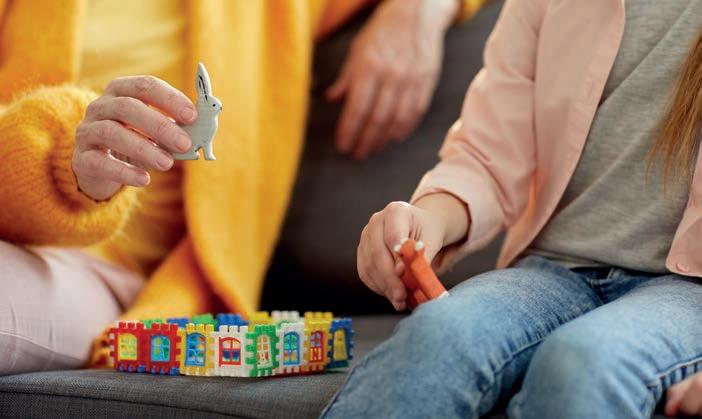
what good practice looks like in practical terms for the various elements of the service – from social care knowing how to access the service, through the assessment itself and associated quality assurance expectations. Part of this is to conceptualise the provision of child protection medical assessments as a service in its own right, much as epilepsy and diabetes services are now regarded, and
neonatolo before that. As you know, the quality of those services has moved forward with the help of a series of national audits which senior managers and funders pay attention to. Apparently, there is such a thing as helpful envy3, which hopefully is the type that I have towards those services who are rightly going from strength to strength.
The current standards and audit relate to
“The standards aim to make child protection medical assessment services equitable for all concerned, regardless of whether they are in a tertiary centre or community clinic, and across all areas of the UK”
child protection assessments being carried out within normal working hours, when it might be anticipated that all necessary provision is available. Even more concerning then that this audit has evidenced a huge level of diversity between child protection medical assessment services. While it was reassuring to learn of several services seeing children within purpose-built, wellresourced suites, it was concerning to hear of quite a number that don’t have access to basic infrastructure, such as photo documentation or to chaperones. The audit also evidences a lack of dedicated time in job plans for clinicians involved in child protection assessments and uncovers insu cient provision of emotional and psychological support for sta in many services.
Having engaged in the audit in the spring/ summer of 2023, participating services received individual reports in November. A reporting generator for this audit is available via the audit website and shows in graphic formats these results at service, Trust, Health Board, ICB, region and country level, so that findings from the audit can be utilised at all levels of the healthcare system.
The child protection service delivery standards and audit have been enthusiastically received by paediatricians who undertake these assessments, whether their main area of work is traditionally described as general or community paediatrics. This audit is about the resources available to paediatricians working in this area, and in no way reflects upon the quality of their clinical opinions. It cannot be easy to work in services that are not well resourced, hence it is so important that the voices of clinicians working in such services are heard by senior management and appropriate support put in place. It is hoped that this audit will be helpful in this regard.
Audit should be part of a cycle. It is therefore important that a way can be found to repeat this audit, not only so that the progress of services can be documented, but also to expand the range of data, from

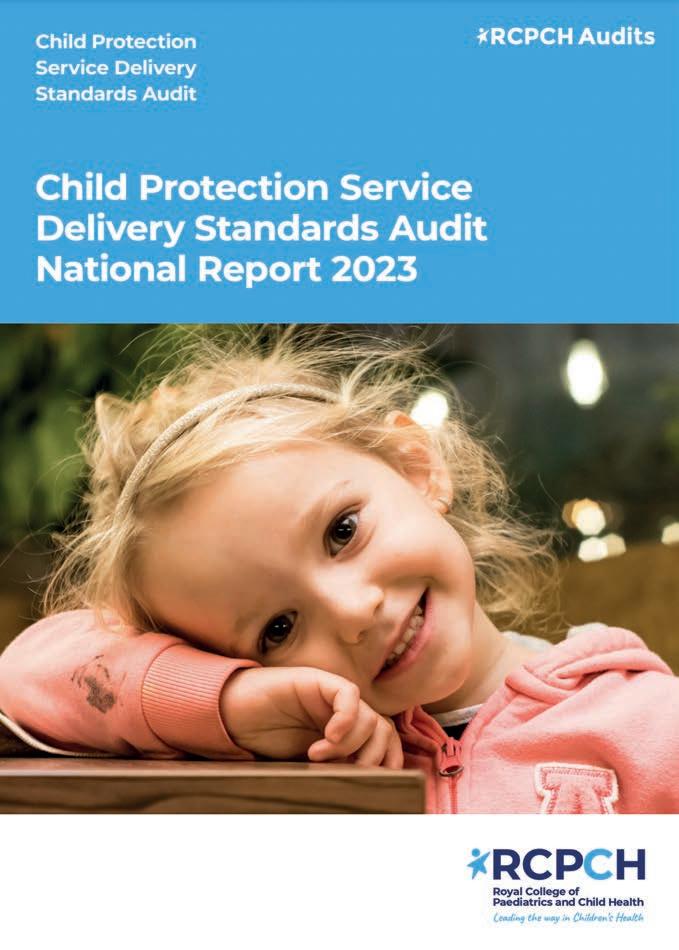

the availability of resources to how those resources are being used. For example, the proportion of children having significant visual findings recorded via photo documentation, or the frequency of skeletal survey use in young children. In adult services there is a wealth of data, such as up-to-date, weekly numbers of hip fractures. So why don’t we know how many children are referred with concerns about physical abuse during school term weeks compared to school holiday weeks?

There is much more to do, but a start has been made. The child protection service delivery standards will be due for updating soon and your views on how they can be improved will be much appreciated.
Find out more:
To read the report, view the data collected and find out more about the audit, please visit: www.rcpch.ac.uk/CPaudit
 Emma Morgan
Emma Morgan
Children and Young People
Vanguard Lead Bristol, North Somerset and South Gloucestershire Integrated Care Board
Iam delighted to be leading on an NHS England Health and Justice South West commissioned project, the Bristol, North Somerset and South Gloucestershire ‘Vanguard’ to deliver the Framework for Integrated Care (Community). The Framework was developed in response to the NHS long-term plan to provide additional support to the most vulnerable children and young people (CYP), who have experienced multiple traumas and have complex needs, in the community to reduce risk and steer them away from the criminal justice system. The programme aligns with the Core20PLUS5 approach to tackling health inequalities, as it is highly likely that this cohort of children are from within the 20% most deprived in England and are at risk of su ering from some of the key five areas of focus, the most applicable being around mental health. The Framework also therefore seeks to achieve a reduction in health inequalities by improving collaboration of services for this group of young people.
Rather than providing a heavily prescribed top-down model of delivery, the Framework provides a set of principles that act as a template for trauma-informed, integrated working, providing preventative
support for children exhibiting high risk, high harm behaviours. The Framework was developed from SECURE STAIRS, a cross-discipline, psychologically informed framework to provide more e ective, integrated and trauma-responsive care for children in secure settings – ultimately to improve their life chances. Further details can be found within the evaluation undertaken by Anna Freud.
The Bristol, North Somerset and South Gloucestershire Vanguard is focusing on three cohorts of children and young people, namely: CYP at risk of school exclusion, those in care or those with a special educational need (SEND).
Data shows that 50% of CYP excluded in the area have a SEND need and once CYP are excluded from school, research shows a strong link with entering the criminal justice system. 85% of boys in Youth O ending Teams had been excluded from school before coming into custody.
The Bristol, North Somerset and South Gloucestershire Vanguard model is made up of seven existing services, which we call our Vanguard Pathways, including child and adolescent mental health services (CAMHS), Youth Justice Services, schools, Liaison and Diversion, Young Victims Service and drugs and alcohol services. Our Vanguard Newsletter contains more detail about each of the pathways.
All of the Vanguard pathways are embedding the Framework principles and work in an integrated, trauma-informed
1 Every interaction matters, with an initial focus on building and supporting positive collaborative relationships.
2 Children and young people, and the relationships they experience, are at the centre of all care they receive through genuine co-production.
3 Those spending most time with the young people are the primary facilitators of change.
4 Positively influencing the day-to-day care is the basis of any intervention and the primary focus of support.
5 All behaviour is understandable in context; there is a focus on developing an understanding of each child’s behaviours and needs based on their story (formulation).
6 There is a commitment by all to build and sustain traumainformed organisations.
way. This is making integrated working a reality between statutory services and third-sector organisations, across multiple local authorities, providing opportunities for shared training and shared expertise.
All the Vanguard pathways are supported by the project enablers: Barnardo’s, Trauma-informed system manager and Forensic CAMHS (FCAMHS).
Barnardo’s lived-experience advisors have supported the project throughout, ensuring that the voice of children and young people is central to the Vanguard. Three



care-experienced young workers have been involved in the design and delivery of traumainformed training. Using examples from their lived experience, they have developed seven steps for trauma-informed practice.
The Trauma-Informed System Manager is hosted by the ICB, supporting colleagues to consider commitments to traumainformed practices on strategic levels and to consider the wider implications of this for the system in BNSSG and for service delivery. This anchor support for the Vanguard works towards the outcome of a trauma-informed system within BNSSG, to embed a system-wide change in approaches, such as supporting CYP and reducing school exclusions as a response to unmet needs.
Forensic CAMHS has supported the Vanguard project
by providing bespoke trauma training, alongside Barnardo’s, to increase: knowledge of trauma-informed approaches and practices; knowledge of supporting pathways in producing action plans to move toward more trauma-informed organisations.
A team from the University of the West of England was commissioned to be the evaluation partner for the Vanguard. Highlights from the interim report outlined that the Vanguard provides an excellent opportunity to bring together a collaboration of organisations to work in unison, utilising a trauma-informed approach and to deliver the Framework for Integrated Care. With the assistance of Vanguard enablers, there is also evidence that the Vanguard can play a part in developing trauma-informed practice

across the South West and integrating responsive systems to reduce inequalities and improve outcomes for CYP.
There is some available qualitative evidence of the impact of some pathways on CYP. Case studies suggest that several pathways are already having a positive impact, however, further quantitative data capture will continue in 2024. Relatedly, the evaluation team also found feedback from referrers, teachers and parents that suggests that stakeholders recognise the benefit of pathways.
In December, relevant leads from ICBs, local authorities and system partners across the South West were invited to a regional Vanguard event to promote the impacts, benefits, and good practice from the Vanguard. Attendees were encouraged to consider how the Framework principles could be adapted and adopted within each system to ensure CYP across the region are feeling the benefits of this programme.
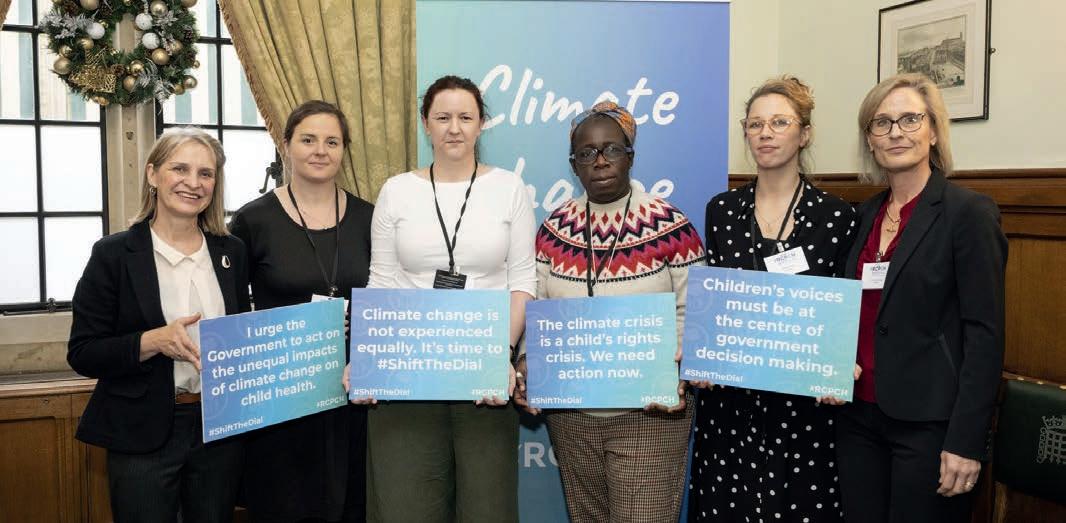

OVER THE PAST few months, I have been privileged to be able to contribute to the College’s work exploring the intersection of climate change and child health inequalities. I’ve been able to do this as a member of the RCPCH Climate Change Working Group and of the Clinical Reference Group supporting the development of our position statement. This campaign culminated in a major launch in Parliament in December, and I joined other paediatricians, College O cers, and child health and climate change experts in Parliament to talk to MPs and peers, and
encourage them to take action. Here are some of my reflections from the day.
Rosamund Adoo-Kissi-Debrah, a passionate campaigner for clean air, spoke about the death of her daughter, Ella, as a result of a severe asthma attack caused by air pollution. She emphasised how and why climate change is disproportionately a ecting the health of families from lower income backgrounds – from living near busy roads, to residing in damp and cold homes, or having less access to green space. Dr Camilla Kingdon pointed out how skilled Rosamund is at speaking truth to power, and I couldn’t agree more – her speech really hammered home the realities for everyone present at the event. We cannot escape the fact that the
e ects of climate change and air pollution are experienced unequally, and will continue to drive already widening health inequalities without policy-making that specifically recognises and redresses this.
We heard a powerful poem by Shreya, from the RCPCH &Us Climate Changers group, about the impact climate change is having on them, and particularly their frustrations about the inactivity of those in power:
“We choke on pollutants. We gasp for every breath; the dust and smoke obstruct our lungs and swamp our vision.
Yet for some reason, we keep our chins up and we look away.”
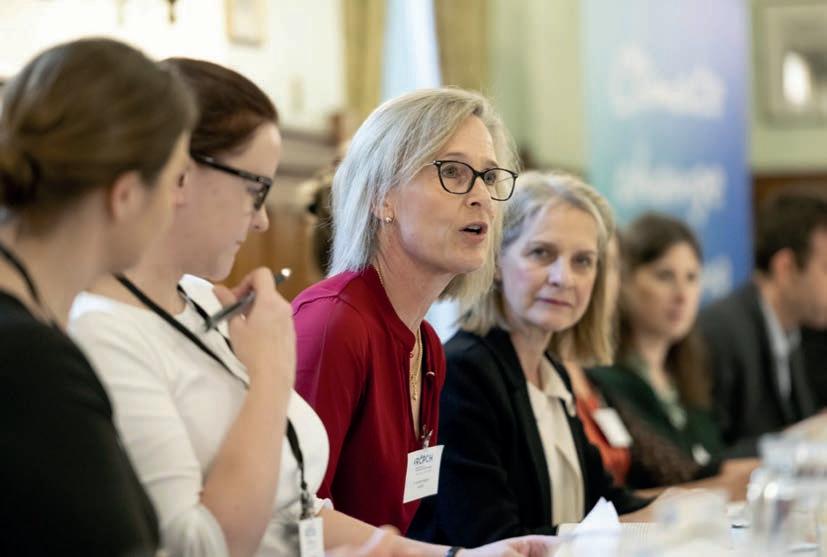
This was accompanied by a passionate video message from the group, and echoed by a young person in the room, who expressed feeling disheartened by the lack of action and not seeing the changes that have been so repeatedly promised. Climate change is seriously affecting the mental health of children and young people. They are the ones who will bear the brunt of the effects, yet they are powerless to make changes, and feel forgotten and ignored by those in power who have the ability to effect change but so far have not.
And this wasn’t just because we were interrupted halfway through the event for an evacuation test! But the discussions did turn to the challenges of trying to influence government decision-making. MPs themselves told us that they too can feel limited in their ability to influence policies, for example as a backbench MP or member of the opposition. We were united in the feeling of frustration that, even when there is widespread agreement of an issue, we still come up against resistance to change, and that there’s still so much to do to raise public awareness about the health impacts of climate change.
people sharing solutions, lessons they’d learned, and optimism that, especially in an election year, there are many ways we can make our voices heard. Even seemingly small actions will build, and cumulatively have an impact. So please, check out www.RCPCH.ac.uk/ShiftTheDial, start that conversation with a child’s family, write that letter to your MP or local council, initiate that discussion within your Trust. And finally, in this election year, use your vote wisely to help prioritise the health of the people and the planet.
“I was surrounded by people sharing optimism that there are many ways we can make our voices heard”
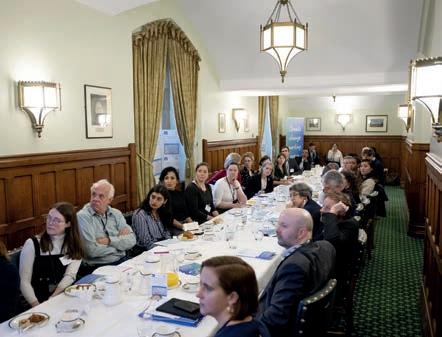
Dr Arpana Soni and her colleagues introduce the principles
It is understandable to feel overwhelmed by the magnitude of the issue and uncertain about the influence any of us can possibly have. Despite all of this, I still came away with a sense of hope. I was surrounded by
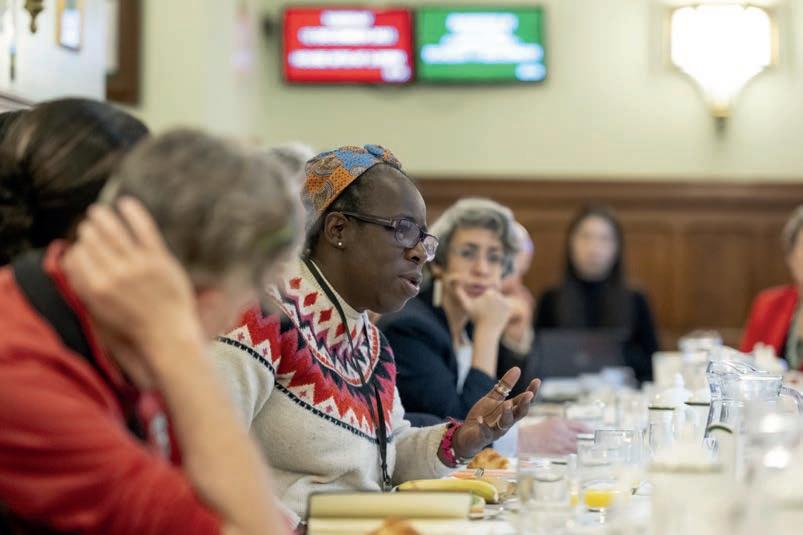

With the National Paediatric Early Warning System (NPEWS) now available for use across England, the Clinical Lead for the NHS England SPOT programme, Professor Damian Roland, provides an overview of frequently asked questions

Prof Damian Roland Professor in Paediatric Emergency Medicine Leicester Hospitals and University @Damian_ Roland
REGULAR READERS OF Milestones will have noted a short article in the Winter 2019 edition entitled “A National Paediatric Early Warning System”.
It concluded:
In the summer of 2018 a group of healthcare professionals – brought together by the College, NHS England, RCN, RCEM and RCGP – met to discuss the potential for a National PEWS as a priority in England. They will propose a standardised PEWS underpinned by a common score for inpatient paediatric units, which will be launched in 2020.
Spring 2020 obviously had other ideas(!) and it wasn’t until November 2023 that the National Paediatric Early Warning System (NPEWS) Chart was launched. It has been a labour of love for the multi-professional group to develop a standardised approach to recognising deterioration in children and young people (CYP). The output is a single chart, instead of many, with a reproducible escalation process that can be delivered in
any hospital setting seeing CYP as inpatients. Building consensus, and demonstrating the need for standardisation, hasn’t always been easy. Rolling out NPEWS is a deimplementation process. All hospitals will have to give up their own charts, some of which they may have been using for many years. However, patient safety is a collective process and we can all agree that the best interests of children are the biggest driver for ensuring we work together to implement this successfully.
The recent National Child Mortality Database review into deaths from infections shows that there is still much more to do when it comes to recognition of illness, and communication between providers and patients across a range of healthcare settings, from primary to tertiary care. Furthermore, no one can fail to have been moved by the recent tragic case of Martha Mills and remember other similar cases where children have deteriorated within healthcare settings. The recently announced implementation of Martha’s rule, a direct way for parents and carers to escalate concerns, will work in syner with NPEWS. Healthcare teams must be prepared for a cultural shift in relation to their approaches to the deteriorating child. It
is important to remember that the incidence of serious and significant disease is relatively static, but presentations and admissions do continue to grow. During the Group A Strep surge in December 2022, emergency departments were the busiest they have ever been without a commensurate increase in admissions. The allegory of a finding a needle in an ever-expanding haystack remains true, and therefore escalation systems must be specific (not over scoring unnecessarily) and sensitive (not missing true cases). NPEWS, piloted for over 18 months in a variety of hospitals, demonstrated a reduction in the incidence of cardiac arrests compared to national trends, without being an obstruction to day-to-day care.
Information on NPEWS has been available for some time in the form of sessions at the RCPCH conference, public webinars, publications, on the RCPCH website and an active FutureNHS page. However, the delivery team recognise there’s always more that can be done to spread the message far and wide. I’m often asked similar questions about NPEWS and I think it’s worth highlighting some of these here (for further Q&As go to the SPOT page via the QR code)
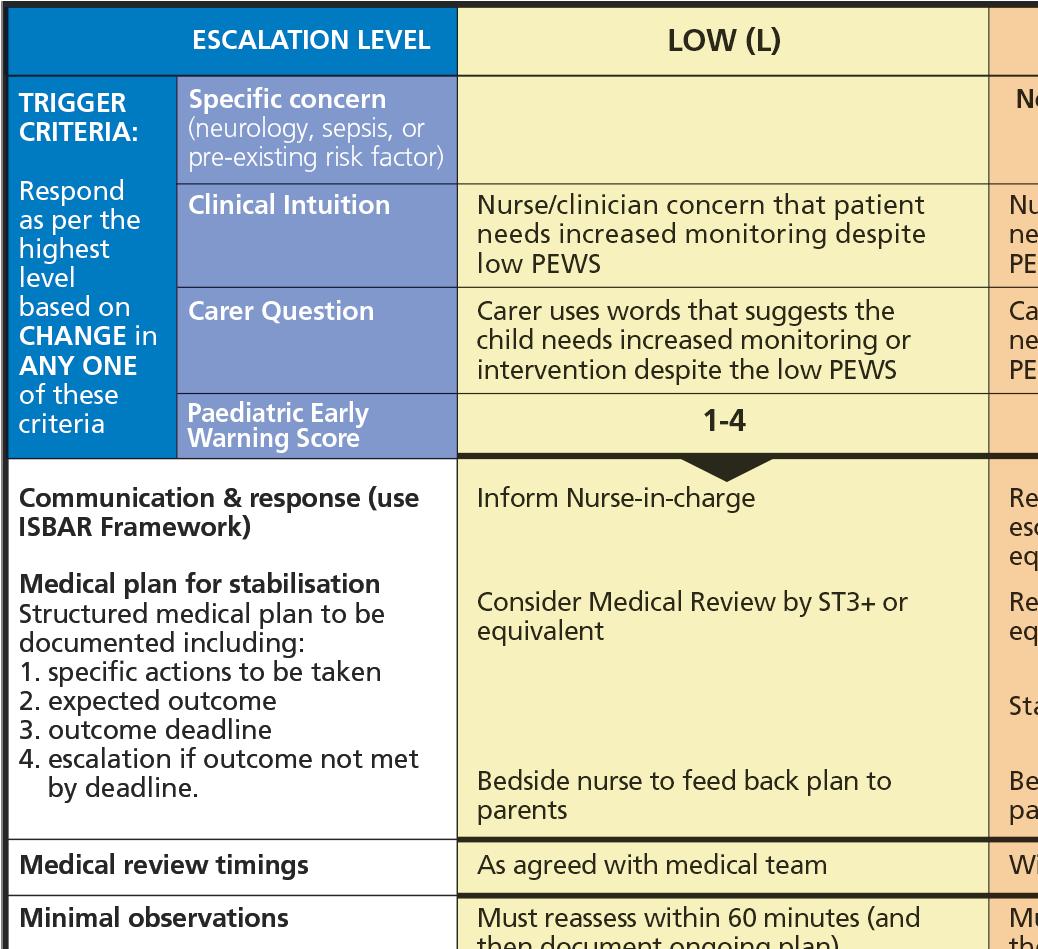
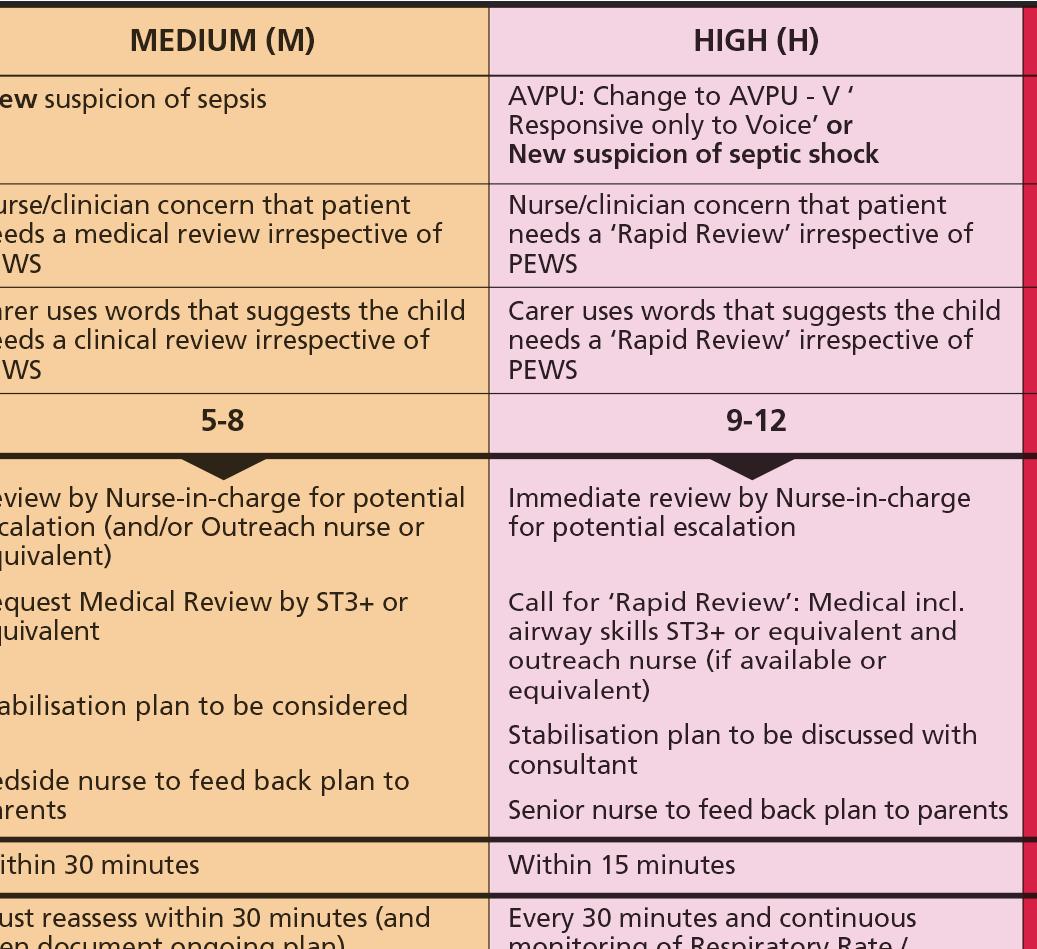
SPOT is System Wide Paediatric Observation Tracking. This is a programme of work which encompasses the rollout of NPEWS Chart. The aim is to have an aligned process across all pathways in which children and young people may become acutely unwell. This may eventually start in the patient’s own home leading all the way to intensive care should that be required. NPEWS is just part of this work which will involve emergency care, prehospital care, primary care and community settings, including mental health.
The SPOT programme is being delivered in England. Both Scotland and Northern Ireland already have a country-wide PEWS in place, and their learning has been useful in the development of the English approach. The Welsh Patient Safety programme has been engaging with the SPOT programme and hopefully there will be collaborations in the future to aid roll out.
Why have you started just with inpatients?
Building consensus takes time and isn’t always a linear process. To ensure that di erent parts of the patient pathway didn’t produce conflicting or poorly aligned products, we felt defining what the common escalation process would be was important. It is too easy to get obsessed with the ‘score’ part of NPEWS but the chart, whether paper or electronic, is founded on enabling not only changing
physiolo to be highlighted, but clinical intuition and parental/carer concern are also equally recognised. The escalation levels are divided into low, medium, high and emergency responses. These escalation levels will carry across patient pathways, from inpatient care out into the community. Having defined this underpinning principle, it is now possible to deliver this in other settings.
Will this chart make our local system less safe?
This is a real and valid concern. Many sites have been using the PEWS for over a decade and it will come as a cultural shock to find perhaps a vital sign that wasn’t previously measured is mandated, or vice versa. We have shown through the pilot process that the transition is possible with good engagement and governance. NPEWS has been analysed against other PEWS and found not to be materially di erent. In fact, changes were made during the pilot project to ensure that the heart rate and respiratory rate cut-o s weren’t overly sensitive. Ultimately, the move to a common process of recognising and responding to escalation that can be delivered to all medical and nursing schools, means all sta will be trained in the same way. The benefits may not
“Quisqui voluptur sit quis et eat, omniaesedi restibus rempos quis minist et mos es et rempos quis minist et mos es et pa es nullaccus alibus nullandit quinist et alibus nullandit qui”

be immediately apparent, and in fact the first year of transition may feel di cult, but the nationwide benefits are for the good of children and young people.
How can we ensure digital providers have the information they need to make the change?
Ultimately all observations will eventually be digital, and the paper chart will become extinct other than for the very rare, unexpected system downtime. We appreciate, however, that transition is not always smooth. For this reason, we have produced a specification for digital providers to ensure that NPEWS has a similar feel, regardless of who is delivering the e-observation platform. This is vital to maintain the principle of standardisation. Providers who are not following this specification cannot claim to be delivering NPEWS and when eventually it becomes a mandated option (a CQUINN is planned for 2024/25), providers will need to be compliant before trusts can contract them. We acknowledge that many trusts are in various stages of their digital transformation and this is not going to be a quick process, so no site will be penalised for matters which are beyond their control.
NPEWS has arrived: please use the QR code for more information or go to www.rcpch.ac.uk/SPOT. These links will also take you through to the vibrant community of practice that exists around implementing NPEWS
 Dr Kate Mullan Paediatric Trainee Simulation & Education Fellow RBHSC @katemullan8
Dr Kate Mullan Paediatric Trainee Simulation & Education Fellow RBHSC @katemullan8
THE TEAM at RBHSC SimEd have created an educational partnership to deliver paediatric education to primary care on an unprecedented scale, broadcasting to a wide range of primary care teams across Northern Ireland.
Hosting quarterly virtual seminars with our colleagues GPNI, we tackled common clinical presentations and fielded questions from GP surgeries across the region with over 2,000 views of the virtual series to date1. Delivered by our diverse, multidisciplinary team of clinical educators, we ensured the delivery of high-quality child health education for all.
Following the significant interest generated, we collaborated with RCGP Northern Ireland (RCGPNI). In November 2023, RBHSC SimEd’s inaugural Primary Care Paediatrics Conference welcomed over 180 healthcare professionals and medical students to engage in a day of clinical education sessions, lectures, interactive workshops, simulation sessions and networking opportunities.
As lead organiser in the SimEd Fellow role, I worked alongside the RBHSC SimEd team including Dr Peter Mallett and Dr Ben McNaughten, in the design and promotion of the conference. We tailored content to engage our audience’s interests from GP, paediatrics and the wider MDT. Our keynote speakers included Northern Ireland medical school directors who delivered medical education updates and outlined the delivery of the new undergraduate child health and GP curricula.
Our team delivered parallel morning and

afternoon clinically orientated workshops. In the lunchtime debate, attendees heard GP and paediatric trainees contest the motion of mandatory child health placements within GP training programmes. Speaking for the motion, we highlighted the importance of paediatric placements to equip GPs with the skills and experience necessary to meet the growing healthcare needs of a diversifying paediatric population, who occupy a significant proportion of GP consults.
The opposing team delivered convincing arguments focusing on the failings of paediatric placements to meet the needs of newly qualified GPs while focusing on service provision. Audience participants discussed alternative care delivery including primary care paediatricians, robust ambulatory services and enhanced postgraduate exposure to community and developmental paediatrics.
On reflection, as paediatric trainees we all have a responsibility to ensure our GP trainees feel supported in joining our teams, and are provided with paediatric placements that can be easily mapped to their learning needs. Locally, our debate has led to further
discussions across training schools, with a review process underway to improve placement quality.
Special guests included Dr Camilla Kingdon, RCPCH President, who praised the event as the highlight of her recent visit to Northern Ireland. Deanery representatives, RCPCH Ireland and RCGPNI representatives also participated. In a recent blog, Dr Kingdon highlights the importance of medical leaders participating in these events to endorse the importance of both specialities learning to work together2. Dr John Goodrich, the chair of Membership for RCGPNI, noted it was one of the most successful and highly attended educational events in many years. This collaboration involved clinicians, academics and educators aiming to deliver high-quality child health education in a day of shared learning and scholarship.
Aligned with the RCPCH 2040 vision, we demonstrate an innovative approach to regional interprofessional education, which other nations could easily adopt. Empowering primary care professionals in their clinical decision-making can improve their capacity and capability to manage the health needs of children and young people. Addressing the gap – specifically the rising number of GPs and their trainees with little clinical experience in child health – we demonstrate how we can strive to improve the quality of care delivered across all healthcare settings.
1. GPNI & RBHSC Paediatric Series Archives 2022-2023 –www.gpni.co.uk
2. Learning together – President’s blog, December 2023 | RCPCH
With hybrid working becoming more common, it’s harder than ever to maintain boundaries and team cohesion, but efficient communication and a better approach to meetings can help
 Dr Jess Morgan Dinwoodie Clinical Fellow for Lifelong Careers RCPCH
Dr Jess Morgan Dinwoodie Clinical Fellow for Lifelong Careers RCPCH
TO some colleagues recently about the deluge of emails they receive and the impact this has on wellbeing. It got me thinking about how technolo has revolutionised the way we communicate, and that, without concerted e orts to set boundaries, it can quickly become overwhelming. We all respond to and manage stress in di erent ways, with our own expectations and preferences of how to communicate within teams.
In many ways, hybrid working has brought advantages: increased flexibility, better work-life balance, and improved productivity. But we cannot ignore the challenges it poses. Hybrid working can impair team cohesion and belonging, leading to feelings of disconnection. There are fewer ad hoc conversations and opportunities for banter over co ee. All too often, meetings run from one to another and we can be sitting at our laptops for hours on end.
The RCPCH Thrive Paediatrics Roadmap for Transforming Working Lives of Paediatricians encourages teams to consider strategies they can use to communicate e ectively, yet not excessively. This pertains to reducing the burden of emails as well as considering the purpose of meetings, who needs to be there, e ective chairing and clear outcomes.
I was recently introduced to the Email Charter (www.emailcharter.info)
Developed by TED’s Chris Anderson and Jane Wulf, it gives practical suggestions for how we can o er each other “digital humanity” and cut down the time we spend on emails. Here are some strategies extracted from the Email Charter:
• Respect recipients’ time Use clear language, keep emails short and to the point. No need for long pleasantries.
• Slow or short responses are not rude Brief emails are easier to read. It’s not personal!
• Make subject headings clear For example, ‘Action needed’, ‘info only’ etc.
• Stop open-ended questions Simple, easyto-answer questions with clear options.
• Slash surplus cc’s Who really needs to read this? Don’t just reply to all.
• Tighten the thread Clean up the thread. What’s absolutely necessary?
• Cut unnecessary responses Replies saying “Thanks” or “great” take up time.
• Do you need an instant response? Phone or Teams could be better, if so.
Using our time e ciently is an important part of tackling an overwhelming workload.
Before setting up a meeting, take a moment to consider the Purpose, People, Aims and Process. Think about who needs to be there and how long for? A chair and a timekeeper can be useful to keep discussions focused and support e ective use of the chat function for questions and comments. Keep meetings to 50 or 20 minutes, building in natural breaks throughout the day.
Finally, in a hybrid working environment where many paediatricians work less than full time, we cannot leave team cohesion and belonging to chance. Actively creating time for connection is important, either by building this into the beginning of a meeting or organising a separate co ee catch-up.
You don’t need to be in a senior leadership position to have an impact on the culture of a department or organisation. By modelling behaviours, whatever our role, we demonstrate that it’s OK to set boundaries.
1. Reach out to your team, especially when people are working remotely.
2. Visibly log o from your computer.
3. Be clear that you don’t expect email replies out of hours.
4. Include your working hours on your email footer.
5. Actively recognise people’s contribution.
For more information on Thrive Paediatrics visit www.rcpch.ac.uk/work-we-do/thrive-paediatrics and email thrive@rcpch.ac.uk to get involved
 Dr Robert Scott-Jupp Retired Consultant Paediatrician
Dr Robert Scott-Jupp Retired Consultant Paediatrician
Well, quite a lot, judging by the enthusiastic attendance at an event at RCPCH on 8 November. President’s Day had been a long-standing tradition enjoyed by retired paediatricians which was stymied by COVID-19, and this year it was rebadged Senior Members’ Day. Approximately 40 people gathered at RCPCH headquarters in London – the first time we had got together at the College since the pandemic.
A warm welcome from RCPCH President Dr Camilla Kingdon was followed by a description of current College activity from CEO Robert Okunnu. Dr Dal Hothi told us about the important work of Thrive Paediatrics in supporting members, including those in the late stages of their careers. We discussed experiences of when things had gone well and gone badly for us, and how learning from these events could help support others.
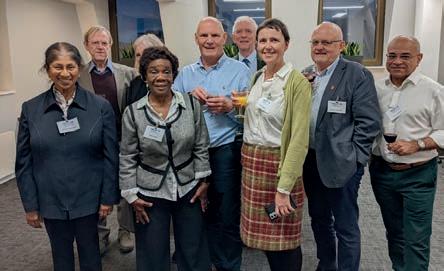
We were privileged to hear from two paediatric knights: Sir Terence Stephenson, former RCPCH President, gave the only science-based talk of the day, describing the work of his CLOCK study into Long COVID in children; Sir Al Aynsley-Green, former Children’s Commissioner for England, talked about his campaign to promote compassion in medical care, based on his own recent experiences.
A theme of the day was around how Senior Members can continue to contribute usefully. We heard about specific College roles that are open to us, to some degree dependent on retaining a GMC licence to practise.
Dr Vivienne Van Someren described her work in coaching and mentoring, how useful this can be in supporting struggling doctors, and how to get involved. Dr Sandy Calvert told us about the retreat she runs, aimed at helping “burned-out” doctors. Dr Tom Lissauer talked about working overseas, supporting paediatric services in low-income countries. Dr Mary Rossiter described her work with older people with dementia. I shared my experience of volunteering with school groups visiting a heritage site, and outlined the variety of volunteering opportunities that allow retirees to continue to work with children.
We enjoyed the opportunity to meet old friends, and to network during the breaks, in a way that has been impossible during the Zoom meetings to which we have become accustomed. Future pandemics notwithstanding, we all hope that this event continues to be a regular feature, and that the College continues to value the skills and experience of its many active Senior Members.
Visit: www.rcpch.ac.uk/membership/thinking-about-retirement
We’d love to hear from you, get in touch through our channels
X @RCPCHTweets
Facebook @RCPCH
Instagram @RCPCH
milestones@rcpch.ac.uk

 Dr Richard Daniels Paediatric Registrar (OOP) Radish @DrRDaniels
Dr Richard Daniels Paediatric Registrar (OOP) Radish @DrRDaniels
I CAN’T BE THE ONLY ONE who’s felt the weight of this winter. It can often be a challenge to find those green shoots of hope needed to turn the tide.
The founding President of RCPCH, Professor David Baum, had a favourite story about a boy and a starfish (you can read it here: www.theki.co.za/ one-at-a-time). The story has been told to many di erent audiences across the world and the underlying message is that even a small act can have huge consequences on an individual.
Prof Baum was a remarkable man by all accounts, and I know some reading this will have fond personal memories of him. Born into a refugee family, he had a packed career, blazing trails in so many areas for those he inspired –his starfish – to follow, and so his impact vastly outsizes his relatively short stature. Talking to those who knew him, I can feel his ener and spark in their words, and how his optimism and support pushed those around him onto great things themselves.
His legacy exists in the foundation of the Global Health programme at RCPCH, in keeping with his advocacy for helping improve the lot of as many as he could.
He died in 1999, on a charity bike ride raising money for his global health programmes aged only 59, and our specialty is the poorer for it.

As Dr Liz Marder reaches the end of her five-year term as RCPCH Treasurer, she reflects on why she took on the role and what it has meant to her
 Dr Liz Marder
Dr Liz Marder
Community and Neurodisability Paediatrician
Nottingham Children’s Hospital RCPCH Treasurer (2019-2024) @lizmarder
BY 2015, I HAD BEEN a consultant community paediatrician for over 20 years. I had held various service development and leadership roles within my department, trust and the local health community. I particularly enjoyed collaborative work with other organisations, and within our regional children and young people (CYP) network.
I strongly believe that the key to improving quality and efficiency is integration of services, working across organisational boundaries. However, although this vision is shared by many, I became frustrated at how difficult it was to get CYP issues on the agenda of the largely adult-focused decision-making bodies. As services changed, and some of my roles came to an end, I felt at something of a crossroads. I sought mentoring from a wise colleague, who encouraged me to think about looking at work outside of our area.
I joined the College at its inception, but had been a somewhat
passive member. I first joined the Invited Review Service and then the Paediatricians in Medical Management Committee. This opened my eyes to the breadth of work that the College is engaged in. I was aware of training, assessment and CPD, however, I was most impressed by the work in improving standards, advocacy and influencing policy. I was keen to get more involved, so when the role of Treasurer came up, I saw it as my opportunity to contribute as a senior officer.
The College Treasurer sits on the three key College committees: Board of Trustees, Council and Executive, and as such gets an overview of almost everything that goes on. The primary responsibility of overseeing the College’s financial affairs underpins all the other work we do. I can’t claim to have advanced financial skills, but with the support of the Finance team, I hope I’ve helped to ensure that the College manages its income, resources and investments in a way that supports all our core functions, allows us to take on important areas of work, and offers value for our members.
“The primary responsibility of overseeing the College's financial affairs underpins all the other work we do”
I feel it is often my role to ask the “stupid” questions, to ensure that decisions made can be explained to members, and that we are acting responsibly on your behalf.
However, it is not just about the money and as a senior officer I have had the opportunity to become involved in so many other areas of work. It has been a real privilege to chair the Nominations Committee, hear about the amazing work that many of our colleagues are engaged in, and be able to offer recognition in the form of College awards. My role as Chair of the Climate Change Working Group (CCWG) Oversight Group has been particularly rewarding, and I am pleased to be leaving the role with RCPCH being seen as a leader in this field among royal colleges, with an Investors in the Environment Bronze award, and having established a new Officer for Climate Change role.
The five years I have been Treasurer have included some challenging times, not least COVID-19, the financial crisis, industrial action, political uncertainty and conflicts around the world, all of which have required a response from the College and/or had an impact on College business. Throughout, I have found the College staff and officers to be incredibly supportive, professional, conscientious and genuinely committed to our aims of improving health for CYP and supporting paediatricians in their work. I thank each and every one of you for your support, and for making my term of office so enjoyable and rewarding.
Aged 13
A FREE-TO-PLAY game with fun modes, in Rocket League you play football in rocketpowered cars using any dimension you want. That's right! You can fly with the ball or keep it on the ground. Invite a friend or three, all the way up to eight players, for added fun. The voice chat feature means you can talk to all of them. Online gaming is good, but co-op gameplay is even better. Yes, you can play Rocket League with someone right next to you. Download it today – you won't regret it!
 Prof Steve Turner
Prof Steve Turner
Royal Aberdeen Children’s Hospital
RCPCH Registrar and President Elect

LESSONS IN CHEMISTRY
weaves together comedy, tragedy and farce, as Elizabeth Zott, a chemistry genius and unmarried mother in 1960s America, attempts to find fulfilment in her work and earn respect from her (mostly male) peers. Elizabeth finds and keeps a dog (Six Thirty, the time she found him), and due to the wonder of books, we can read the dog’s dry view of Elizabeth’s plight; very reminiscent of Snoopy, and for me brought a thoroughly enjoyable perspective.
With some inevitability, Elizabeth’s (mostly male) superiors can only manage her brilliance, and her fearless determination to say what she thinks, with constructive dismissal. But the cream always rises to the top – Elizabeth applies her scientific knowledge to cooking and, despite everyone’s best efforts, excels as a TV chef.



Dr Ashish Patel Consultant Paediatric Nephrologist
Leeds Children's Hospital @DrKidneyAsh
I DON’T COPE WELL IN THE COLD – I blame it on my Indian roots. Thankfully one of my o ce buddies enjoys our o ce being a sauna as much as I do. Over the winter months I tend to become quite introverted, enjoying nights on the sofa under a bunch of blankets, with the fire on. Snacks are vital, particularly cookies. I discovered these snickerdoodles in my local German market – crispy around the edge but soft and chewy in the middle makes them the perfect cookie in my eyes. The cinnamon sugar coating adds a level of warmth that I love. I gifted a few batches of snickerdoodle cookies to the team over Christmas in my ‘bake bags’ and they went down an absolute treat. They take no time at all to make, and can easily be taken round to friends or family for a cup of tea and a catch-up!

INGREDIENTS
1
¾
¼
½
60
1½
Instructions
1. Cream together the butter and caster sugar until light, flu y and pale – this is easiest with a stand mixer but you can also do it with a hand mixer. Scrape down the sides of the bowl every few minutes to ensure both ingredients are incorporated.
2. Add the egg and vanilla extract and fold together until it looks like a pancake mixture.
3. Mix together the dry ingredients and fold into the wet mixture until you get a cookie dough. It will be slightly sticky.
4. Cover the bowl with cling film and place in the fridge for 20-30 minutes.
5. Line two baking trays with greaseproof paper. Preheat the oven to 170°C (fan assisted)/190°C (non-fan assisted). Make the cinnamon sugar.
6. Remove the dough from the fridge and roll into balls, roughly 30g each. Toss in the cinnamon sugar and place on the baking tray.
7. Bake for 10 minutes. They will come out quite soft, but firm up. Best to underbake than overbake. Eat while warm. Enjoy!





Consultant in Acute Paediatric Medicine, Jenny Lind Children’s Hospital, Norfolk and Norwich University Hospitals NHS Foundation Trust

@DrNickTwit
1) Describe your job in three words. Distracting worried parents.
2) After a hard day at work, what is your guilty pleasure? Why does it have to involve guilt? I’m currently playing Baldur’s Gate 3 (in the few hours my children are both asleep).

3) What two things do you find particularly challenging?

Angry people and foreign languages.
4) What is the best part of your working day?
The huge variety of general and emergency paediatrics.
5) What is the one piece of advice you wish you could impart to yourself as a junior trainee?
Keep notes on the stock market so when you get to give advice to your past self you know what to recommend…
6) Who is the best fictional character of all time, and why? Ti any Aching [from Terry Pratchett’s Discworld series of fantasy books], because she is a little bit of all the best healthcare workers I’ve ever met, and she could turn you into a frog.
7) What three medications would you like with you if you were marooned on a desert island filled with paediatric patients? Are these medications for me or the children? Co-amoxiclav (sorry, infection control), paracetamol and salbutamol.
8) If you were bitten by a radioactive gerbil, what would you like your superpower to be, and why?
I would like to bend time to my will, because I’ve got a lot of stu to do, and I’d really like more time to play computer games while my children are asleep.
9) What is the single, most encouraging thing that one of your colleagues can do to make your day? Co ee?
10) How can you and your colleagues inspire the next generation of paediatricians?
I think we need to make our working lives fun and sustainable. I want the doctors in my team to look at us as a group of consultants and think, “They look happy. I want to work with the happy people.”
ST1, Jenny Lind Children’s Hospital, Norfolk and Norwich University Hospitals NHS Foundation Trust @Nikkiconquest
1) Describe your job in three words. Clerking, rounds and bubbles.
2) After a hard day at work, what is your guilty pleasure?
Terrible reality TV – the trashier the better. Selling Sunset is a family favourite.
3) What two things do you find particularly challenging?
As a new mum it can be hard finding the perfect work-life balance. Also, when I am at work, it can be frustrating when you are needed in two places at once.
4) What is the best part of your working day?
Getting a high-five or seeing a smile spread across a child’s face when they're starting to feel more themselves.
5) What is the best advice you have received as a trainee?
“If something feels dod , then it’s probably dod .” It was regarding someone’s inappropriate referral, but it reminds me to trust my gut, and question things that don’t make sense.
6) Who is the best fictional character of all time, and why?
Forrest Gump – he goes on such a massive journey, with so many challenges, and just keeps going.
7) What three medications would you like with you if you were marooned on a desert island filled with paediatric patients?
Salbutamol, paracetamol and antibiotics (probably co-amoxiclav).
8) If you were bitten by a radioactive gerbil, what would you like your superpower to be, and why?
I can’t bear queuing in tra c or being late, so I’d love to be able to teleport anywhere.
9) What is the single, most encouraging thing that one of your colleagues can do to make your day?

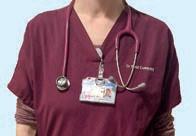
Clearing the list of the things to chase for patients, or something as simple as telling me I’ve done a good job.
10) How can you and your colleagues inspire the next generation of paediatricians?
Set a good example in really looking after each other and continue to make paediatrics the happy place to work that it is!



“I love interacting with children”Dr Ian Lewins
I became a paediatrician because my dad was a paediatrician. I was never pushed into medicine, let alone paediatrics, but I guess there must have been some influence there. After completing my house o cer posts, I applied – unsuccessfully – for a paediatric training post. Fortunately, local legend, Dr Judith Grant, took pity on me and o ered me a locum post in the paediatric emergency department in Nottingham. Those 12 months cemented in my mind just how much I enjoyed working with and helping children and their families – and that I never wanted to go within 100 yards of an adult patient again.
My typical working day starts with catching up on emails and then listening to a podcast on my commute into work. If I’m on the shop floor, I’ll oversee the paediatric emergency department in Derby and the huge variety of patients that present to us. I have a couple of additional roles that form part of my job plan: I’m the ACD for the department, which involves attending senior team and strate meetings, undertaking appraisals and job planning, as well as responding to complaints and patient safety issues; I’m also the Deputy Director of Medical Education for the Trust, which allows me to have a degree of oversight and influence on the direction of education for all doctors in training in the hospital. While this keeps me extremely busy, I believe it is these portfolio careers that provide variety and longevity, especially when working in emergency medicine.
The most di cult part of my job, from an organisational perspective, is when the emergency department is extremely busy with tired and frustrated patients and their carers. Everyone wants to deliver good
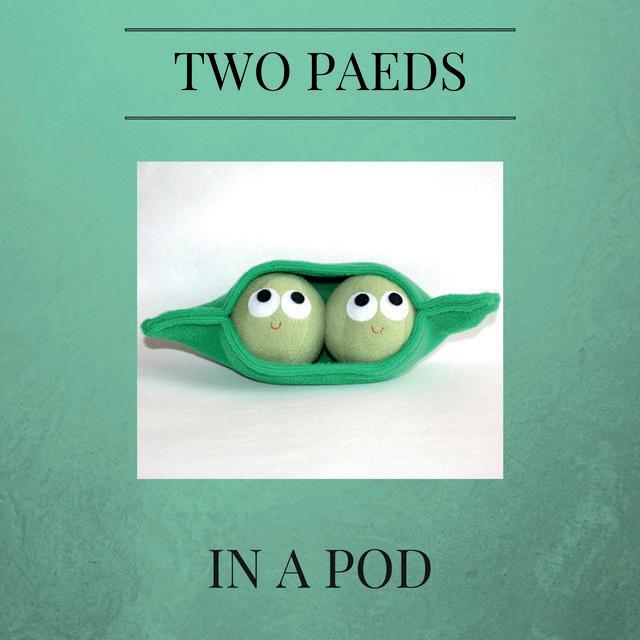
quality care in a timely manner, but it can be extremely challenging when we simply don’t have enough sta or resources. The very toughest part of this post is delivering bad news to parents, or even telling them that their child has sadly died – no one who has experienced the sound of pure grief a parent makes upon hearing that will ever forget it.
The best part of the job is working in a team that all pulls together to achieve the same goal. Seeing everyone being able to undertake their jobs to the best of their ability is hugely rewarding, and those rewards are passed on to our patients and their families. I love interacting with children and will never get tired of it, which keeps the job fresh and interesting. As my mentor once said, “The hours may be long, but the minutes are brilliant”. Another highlight is when Max the therapy dog visits on a Friday.
My most memorable moment was after one of my first few weekends as the consultant on-call. I was caring for a young patient with a catastrophic intracranial bleed. After stabilising him, and arranging his transfer to the local neurosurgical centre, I spent a long time counselling his parents that their child might not survive. I didn’t hear anything back and presumed the worst. Several years later, I was in the emergency department and saw a smiling lady frantically waving at me. She called me over and there was the patient I looked after, now grown up and in perfect health. Moments like that are utterly irreplaceable and truly make it worthwhile.




When I finish work, I like to indulge my enthusiasm for medical education, which has led to me creating an infographic website, PEM Infographics, and a podcast, 2 Paeds In A Pod. Creating content for these is hugely rewarding. I also enjoy reading. One of the best things I ever did was take my phone out of the bedroom and replace it with a book. This stops me doomscrolling, improves my mental health and helps my sleep. Dr Mike Farquhar would be proud of me!
